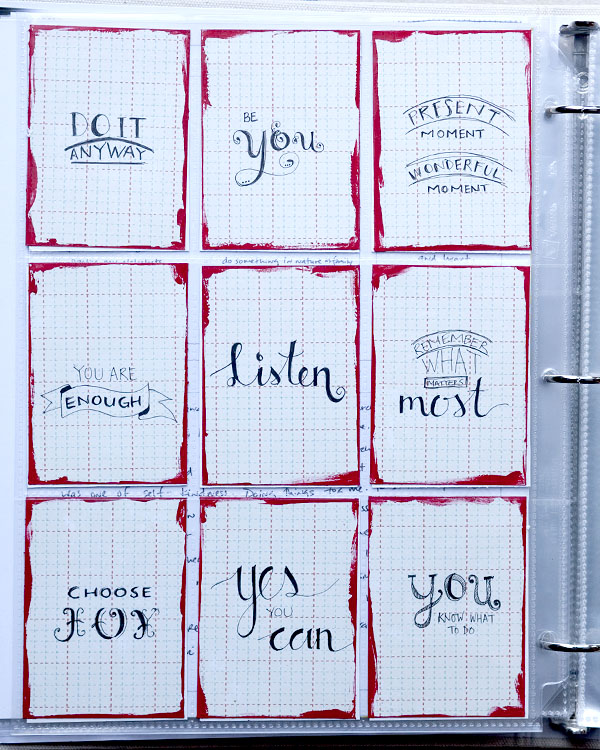
I’ve been grumpy lately. Actually, that’s not accurate. I’ve been down. I’ve noticed that these cycles seem to come and go. I wake up one morning and just seem to feel low for no apparent reason. And then my perspective shifts so that I am seeing everything with negative-eyes.
Which only serves to perpetuate my sadness.
I’ve learned that, at any moment in time, there are things that make me happy and things that frustrate me. The contents of the list might change but both lists are active at all times. How I feel about my day, and life, depends on which list I am focusing on. On the rougher days, I look at the “happy list” but none of the items seems to penetrate through the wall of sorrow. I feel like they are all fake or things that can be taken away at any moment in time. Whereas, on a happy day, the things on the “frustrating list” seem completely surmountable or insignificant.
While I know it’s about my perspective (or maybe hormones), what I don’t know is how to tip it from one to the other. What’s even more frustrating is that when I am in this not-so-positive space, I sometimes do things that disappoint me. Like eating things I know aren’t good for me. Which then perpetuates the bad feeling. So I get stuck in my own cycles.
Since it’s been more than a week, I am agitated and completely ready to snap out of this place. If I could force or shame or even cheer myself out of this place, I totally would. But none of those seem to have worked. So, this morning, I went to my intentions cards from the One Little Word, so I could see what I’d originally chosen for May.
It said “Physically Present:” Go outside. Breathe. Breathe more. Can you do more to be healthy? What needs attention now?
At first I thought, none of this is helpful. Then I thought, why not. Maybe this is exactly what I need right now. To get out of my head. And what’s the best way to get out of my head if not being more physically present? I’ve decided I am going to take long-ish walks every day this week. I’ve also decided to take two days off and be more physically present at some of the events at my kids’ schools and see if these help me get out of my head a bit.
So there we are. If you have these cycles and have ideas on what helps to snap out of them, I hope you leave me a comment. I am up for trying creative solutions at this point.

The One Little Word assignment for May was to create cards with some of the Little (and Big) Messages. Ones you’re saying, ones you’re listening to, ones that seem to keep coming up again and again. Ali also made hers cute and practiced some creative ways to write them. Since I’ve wanted to work on my lettering, I decided to try a few styles I’d been saving on Pinterest.
The first thing I did was to brainstorm a list of messages. Here’s what ended up on my list (the bold ones ended up on my project above), in no particular order:
- Remember what matters most
- Choose joy
- Be you
- Yes, you can
- you know what to do
- you are enough
- Present Moment, Wonderful Moment
- Be here now
- To be alive is a miracle
- Present moment is the only moment available to me
- You get to decide
- Listen
- Establish yourself in the present moment
- You still have time to change the road you’re on
- Reflect others’ brilliance back to them
- Practice Gratitude
- Nourish your mind, body, and soul
- Do it anyway
- You are not alone
- Everything is unfolding exactly as it should
- You can rest
I probably could have gone on and on. I love these messages and I would love to have a long list of messages to remind myself regularly. Do you have some messages of your own? I’d love to add to my collection.

Here’s what I read today that had me think:
Don’t save something for a special occasion. Every day of your life is a special occasion. -Thomas S. Monson
and i thought: a fancy pair of heels, some paint i’ve been hoarding, a dress i love, dishes that make me happy, an art journal i bought weeks ago, my desires to travel, and maybe saddest of them all: my happiness a bit.
What are you saving for a special occasion?

Since I started getting up at 5am, I’ve been starting my days with a body scan meditation and then some journaling. In the first few days, both of them were very centered, insightful and rewarding.
But in the last week, I’ve noticed a slight shift. I am more tired and more impatient during my body scan. I am only halfway present (at best) and then a lot of my journaling is ranting or at least complaining or at best whining. I am not a fan of this kind of journaling. I understand that, for some people, it serves a purpose to unload or get it out of their system. But, for me, it just puts me in a bad mood or makes me feel sorry for myself.
So not only have I been not present in my mediation and whining in my journaling but then I’ve been spending my days being grumpy and frustrated. Clearly not the point of going through the effort of waking up at 5am.
On my way to pick up Nathaniel from school today, I was listening to Tara Brach’s dharma talk on Listening. She often mentions sitting with something and noticing what shifts or comes up as you sit there and allow the feelings to be present (without judging them.) I often ask my clients the question of what’s under a particular thought or feeling, so it felt obvious that I should do it too.
As I was driving, I started paying attention to what was there. Sadness, frustration, panic, hopelessness, worry, anger. I didn’t judge any of them. As more came to the surface, I noticed them shift and change shape. It made it easier for me to understand why something trivial-seeming might feel so heavy. Once I uncovered all that was under it, it was obvious that this one thing was just a manifestation of a much bigger worry.
This is the thing with listening without judgement: it opens the space for you to notice all that’s there. not just the one symptom but everything. And it is only when you allow yourself to see everything, to accept everything that you can begin to heal.
Acceptance doesn’t mean liking it or even approving of it. It just means being willing to see what’s already there. Because what’s already there is in fact already there. Not acknowledging it doesn’t make it go away. It just makes you bury it under shame, anger, or other unproductive feelings. And it also doesn’t allow you to see/know what’s really there. You’re not seeing the full picture.
I don’t know that acknowledging what is means you now know how to solve it. But I do know that not acknowledging it is definitely getting in the way of any shift or resolution.
Since I was driving when all this came to me, I decided my plan for tomorrow morning is to really listen. Not be frustrated about how badly I am meditating and not to use the journaling to whine but to keep answering: “what’s here now?” so I can keep digging and digging and shine light on all that’s hiding in the dark corners.

As I was setting my intentions for this week and answering the questions, one of them was about what I want to receive into my life this week. The first words I wrote were: kindness. acknowledgement. community.
Then I had a moment. One of those rare moments where you can see your life from the outside and realize how amazing it is. I then wrote “I am ready to listen for the good. All this week, I will listen for the good and see what I hear.”
The thing is, I have all these in my life already. But I don’t really pay attention to them. I tend to be one of those people who’s really focused on improving. I also find the “bad stuff” easier to believe. It’s part of what I talked about last week. When you believe there’s something wrong with you, all the criticism serves to perpetuate your story so you listen to it and you hear it more clearly than anything else. And you believe it. (because you already believed it before it was even said.) This means the that the “bad” voices are much louder than the good ones.
And part of being done with that story is starting to balance out the listening. Starting to pay attention to the good. And to really hear it. Ideally, I’d say “to really believe it.” but considering I don’t even hear it, I think listening for it is already a pretty big step for me. And before I can believe it, I need to be able to hear it. To listen for it. To really see it.
So that’s my plan for this week. To really really really listen for the good. To remember it. To notice it. To look for it.
To make myself more accountable and to lock it in, I also gave the same challenge to David so we can compare notes each evening and exchange five good things we heard each day. This will mean we’re both going to have to work that much harder to listen for it, hear it, remember it and share it.
If you’d like to join us, I encourage you to spend this week listening for the good as well. Cultivate the joy. Say thank you to compliments. Believe the positive words. Be grateful. Pay attention, accept, and cherish the love, acknowledgement, kindness and community that’s already coming your way.

I was listening to one of the recent Tara Brach podcasts yesterday morning and she said something that made me stop sketching so I could write it down:
What if you didn’t believe anything was wrong with you? Who would you be?
My first thought was “I have no idea.” I couldn’t even fathom this possibility. It was so far out of the realm of my imagination that absolutely no answer lept to my mind.
Immediately after realizing this, I felt a deep sorrow. And then I got angry.
Here’s the thing: There was a time in my life, many years ago, when people were very mean to me. It wasn’t anything that was earth-shatteringly dramatic or even what could be defined as a tragedy. Compared to what many, many people endure, this was nothing. It was the typical cruelty of young children. Saying mean things, being insensitive to others’ feelings. But, maybe I needed acknowledgement and support more than others or maybe I didn’t feel a fundamental sense of belonging I craved. Either way, at this young age, I heard the message that there was something wrong with me quite regularly. I don’t even think it was intended maliciously. But it was said. It was implied. And at some point, it was even assumed.
I think being different isn’t encouraged or applauded, especially at that age where all we strive to do is fit in. And I simply did not.
But then years passed. I had friends who truly, deeply loved me. Friends who accepted me. I left a lot of the stories and people behind. I charted my own path and, on most accounts, succeeded in my hopes to make a life for myself where the kind of person I am flourished. I loved and was loved. I let people see me.
Despite all these things, I continued to hang on to the belief that there was something fundamentally wrong with me.
It was as if on the surface I’d changed my life, surrounded myself with these people who loved me, moved to a place where I felt a stronger sense of belonging, got a job at a place I felt comfortable, married someone whom I loved and who loved and accepted me for who I was. And yet, underneath it all, this voice inside still insisted that there was something wrong with me. Despite all the layers I built on top, the foundation was not solid. It was just cleverly hidden out sight.
What’s even worse is that I had made “there’s something wrong with me” a part of my self-identity. So I kept looking for excuses to self-perpetuate the idea. I continually listen for the bad. When people say kind things, I forget them almost instantly. And yet, when there’s a tiny criticism uttered, I cling on to it for dear life. “See?” that inner seed says, “I told you there’s something wrong with you.” It feels like a disease inside me that feeds on whatever it can get.
But here’s the truth: it’s not a disease.
It’s a choice.
I am almost forty. Maybe I didn’t get to decide how people treated me when I was six. Maybe they got to have a say on who I was then. (even then i had a choice, but let’s say i didn’t.) I am not six anymore. I am not helpless. Their voices are no longer louder or more important than mine. In this case, they do not even matter anymore. Not in the least. I never see these people and they are insignificant to my life.
And yet, I’ve spent 34 years of my life keeping their words alive. I’ve dedicated my life to proving them right. I’ve continually chosen their meanness over love and kindness and truth. The more I thought about it, the more I realized how much I’d done that. How I can still hear them when I get silent. And it makes me mad. (and sad, of course. disappointed. sad. hurt.)
So here’s what I decided after spending some time with the sorrow and the hurt and anger: I am done.
I don’t want to live this way any more. I have no idea who I would be without these thoughts. I have no idea what’s possible for me.
But I want to find out.
It may be a long journey but it’s a worthwhile one. And I know that 30+ years of self-identity will not disappear overnight. But I also know that this is a choice I make. And maybe bringing a lot of awareness to that fact will allow me to pause in that split second of choice and make a different one instead. This is what I want for myself. If I didn’t automatically think that there was something wrong with me, what else might be possible in this moment? Where else could I go with this comment. Can I be more open to receiving love, kindness and compliments if I opened to other possibilities?
I don’t know.
But I want to find out.

I’ve been a life-long learner.
If you’ve been a reader of karenika with any regularity this won’t surprise you. Learning is one of my core values. I’m interested in just about any academic subject as well as arts, self-growth etc. In my dream world, I’d be in school for the rest of my life, taking any class that interests me and continually learning new things.
So imagine my surprise when I realized last week that much of my recent grief was coming from situations where I felt like I should know. There were situations at work, with my coaching certification, with being a mom or a wife or even a friend, where I kept judging myself for not already “knowing” the right answers. When I noticed this, I almost laughed out loud. Here I stood, a learner who kept punishing herself for not knowing and thus in her panic and frustration and shame, closing the doors to any possible learning.
I got an email this week from one of the women in one of my book clubs. She was in the middle of reading a current and popular book. She thought it was really interesting and wanted to discuss it with others. So much so that they decided to add in a new date to meet and discuss this book in a few weeks. I had a very specific bias and rant against this particular book and had already decided not to read it. So when I first got the emails, I ignored them.
As each woman in my group replied on whether or not they would attend, one of them said she wanted to come but didn’t want to read the book and would that be okay. The original girl replied with something like as with each time, you’re welcome whether you read the book or not but i will say that in my experience the discussions between those who read it and those who didn’t read it is really different. Then she linked to an article discussing why it mattered to actually read the book vs just talking about the issues in the book.
I am not sure what compelled me to click on it this morning at 4:45am but I did. And I read the whole article. As soon as I finished it, I knew I was going to read the book. Not because it was necessarily a compelling read or that I’d changed my mind about it, but because I realized that I was clearly standing in a specific perspective about the book, the author, the topic and I already had opinions on all. Reading the book from that perspective would have taught me nothing. I would likely have used it to confirm my bias and continue with my already well-developed criticisms on this topic.
Now that I read the article (and emailed back and forth with the person who sent the email) I will read this book with a completely different perspective. I am now curious and open to what I might find. Open to looking at the issue differently. Open to learning.
When I approach something with the idea that I should know it or that I already know it, there’s no room for growth or learning there. There’s only room for judging and criticizing.
For a life-long learner, that seems like a non-ideal space.
So my goal for the next few weeks is to really explore the idea of learning vs knowing. What else am I approaching in my life from the perspective of already knowing or feeling like I should know? What’s the cost of that to me? What opportunities am I giving up when I choose this perspective?
And, most significantly, how do I find my way back to choosing to learn and grow?

I was reading Momastery this morning when I came upon this little snippet:
I feel like I should have some of it figured out for you. I should be well rounded and confident and secure. I should be more like Cheryl Sandberg, really. I just finished Lean In – her new book – and I liked it. Good woman, good book. Lean In is about how we as women need to lean in to our careers and accept more responsibility and not worry so much about balance, I guess. She seems to have a lot figured out – she doesn’t seem tortured by any of it. Me – I’m a little tortured. I know my work is important, and I’d love to keep Leaning In, but mostly I just want to Lie Down to tell you the damn truth. Perhaps that will be the title of my next book.
I have to say that I resonate with this. I worry. I’m a little tortured. I know that worrying isn’t useful and I am working on it. blah blah. But I also know that there will be some of me that worries. And I am learning to embrace who I am. I don’t mean to imply that worrying is a good thing. Or that worrying means I care more. It’s just who I am. It’s a part of me and while I’d like it not to interfere with my life or joy, I am also ok to accept it as a part of me.
I was then listening to a podcast and someone said something like when we meet people who know stuff we don’t know, we assume they know more than we do. I think this is so true. It’s like when we meet people who do different things than we do, we assume they do more not different.
We take what we see in them and overlay it onto our own lives. We don’t realize that they might know these things but not some of what we know. People often reach out to me and ask me how I manage to do all I do. They assume I do all they do plus all I do. I reply and tell them that I don’t cook or clean and that gives me a lot of time they might not have.
This is a crucial thing to keep in mind. I think we are inadvertantly comparing ourselves when we read things or hear things. Not everyone is the same. People talk about what they care about and don’t talk about things that do not matter as much to them. Sheryl cares about women having a place in the workplace and she probably doesn’t care as much about some of the things that might matter to you. I care about making art and not as much about cooking. There are some things I know better than you and other things I don’t know at all. Sheryl doesn’t worry about balance (or maybe she does in some other ways, who knows? In fairness, I haven’t read her book, I am just using Glennon’s quote above as my reference). I do. I decided long ago that it matters to me to be home with my kids, even if I am working and they watch TV more than they should because of it. I am not doing it for them. I am doing it for me.
I’d like to be well-rounded, confident, and secure, too. But I also know that we’re making that assumption about Sheryl because of her book. This might be an area where she is all those things. But there are probably other areas where she is not (and I am.) And maybe she doesn’t care about those.
The thing is we are each very different from each other. We have differing values, schedules, histories, and preferences. And, to add to it, many of us are married to another person who also differs in all these things creating yet a third dynamic of a marriage where there are values, schedules, histories and preferences that might slightly (or wildly) differ from each of the individuals in that marriage. There are a lot of elements at play here and to make a simple assumption that the one, tiny side you see of someone represents them in any major way is just too simplistic.
I have come to learn that no one has it figured out. No one is 100% confident or balanced or perfect. Or even 100% happy. We are all tortured in our own little (or big) ways. When we see others who do not share our particular tortures, we don’t realize they may have a set of their own. We assume the worst of ourselves and the best of others. (by the way, this is one of the reasons I like blogs that tend to be more honest in sharing some of the harder sides of life, they force you to remove your rose-colored glasses when you read the blog.)
Come to think of it, I don’t even think life is about having it all figured out. What would be the point of that? It’s about trying to be here, in this wonderful moment. As Thich Nhat Hanh says during my morning meditation:
Breathing In, I go back to the Present Moment. Breathing Out, I know this is a Wonderful Moment. The moment when I realize that I am still alive. I can touch life. Because to be alive is a miracle. To be alive and to know that you’re alive is the greatest of all miracles. And if you don’t go back to the present moment, you cannot perform that miracle…..This is a Wonderful Moment. In fact, it is the only moment available to me to live
It’s not about being perfect or having it all figured out. It’s about fully being here, right now, and enjoying this very moment.

I mentioned a few weeks ago that I’ve begun using the Life Organizer book each week. I sit every Sunday night and journal on that week’s questions. While most of the questions vary, there are a few prompts that are the same each time. These are: intention, let go of, have to, and could do.
I’ve talked about setting intentions a few times recently, but I haven’t really mentioned the others much. My feeling is that if you can only do one thing each week, setting an intention for the week is the best place to start. It allows you to start your week with a particular mindset, perspective and a focused awareness.
But assuming you’re willing to stretch a bit (or if setting intentions doesn’t do it for you) I think the next great one to tackle is “let go of.” I love the idea of letting go of something each week. I feel like we all carry so much baggage. And I feel that’s what gets in the way of most of our being in the present moment and our worries and anxiety. I have ideas around who I can be in the world. I have ideas around what I am capable of and what my limits are. Around how likable and worthy I am. Around what others think of me. The list goes on and on.
Each of these things seem like great opinions to revisit and see if I can let them go.
But even tiny things are worthy of this level of questioning. For example, this past weekend was fuller than usual for me and I ended up not being able to rest as much as I would have liked. On sunday night, I noticed that I was carrying around the aggravation of having this weekend cut short. The frustration of not being able to go through my todo list. And the unease of having to start a week without feeling fully fresh.
Ordinarily, these would nag at me and taint my week, but because I was doing my journaling last night and came upon the “let go of” prompt, I thought about it and decided letting the frustration and unease go would create the space for me to start the week without baggage and would give me week a chance to be successful and delightful. (Or at least it wouldn’t start the week grumpy.)
Had I not committed to doing the prompts, I probably would have carried it over for a few days (or even longer) before I realized the damage it was causing.
Now that I think of it, for me, letting something go is the opposite of setting intentions. When I set my intentions, they are often to welcome something new into my week. A new level of awareness, openness, or presence. And when I am letting things go, I am saying goodbye to a particular feeling, way of thinking or behavior. So they go hand in hand: inviting something new and giving up something old.
I like the idea of doing both.
When was the last time you invited something new and/or let go of something?

If you read here with any regularity, you know that I worry a lot. I tend be on the anxious side and this is one of the things I want to work on because I find that anxiety can be contagious and it’s also, for the most part, a wasted emotion. It doesn’t put me in the most resonant space.
One of the aspects of anxiety I’ve been focusing on lately is getting clear with what really matters to me. What’s important to me. And, just as significantly, what’s not important to me. One of the reasons this matters is that I feel more anxiety when I worry about being judged by others. This is aggravated when I’m already judging myself, too. I find that this happens more in areas where I am not clear about what matters to me and what doesn’t. (Or when I am not behaving in a way that’s aligned with what does matter to me.)
If I am really clear, other people’s opinions will not affect me. For example, I am clear that giving my kids the choice of what to wear (assuming a basic level of cleanliness) is more important to me than worrying about whether my kids’ clothes match. At the age they are, it’s one of the areas they get to express individuality and exercise choice. So when other parents judge me about what my kids are wearing and how it might not match, I couldn’t care less.
I am also clear that I need to spend time alone each day. Doing something that fills my soul. Art, reading, writing, whatever. If others judge that I am not spending this time with my kids, I don’t feel any guilt about this. I am clear that I need time with my husband alone. I am clear that I like to be with my kids at home and willing to take the impact of that on my career. None of these are judgements of what others should be doing with their life or kids. It’s just areas where I am clear about what matters to me so I don’t tend to feel anxiety around them.
But then there are other areas where I am less clear. Like how much and what kind of extracurriculars my kids should do. The importance and relevance of play dates (vs the cost of time and effort it will take us to make them all work.) The cost of a new task I might undertake (like coaching) on my family vs the personal rewards. The value of particular types of vacation over others. The list does go on for personal stuff, family stuff, career stuff, etc. etc. When I am not sure what I value, other people’s opinions get in the way of my thinking clearly. I overvalue their judgements. I start worrying, feeling small and inadequate.
This doesn’t mean they are right. It means that this is an area where I have to think more and get clear on where I stand. Because here’s the thing: no one knows what’s right. No one. No. one.
We all just have our own opinions, beliefs and perspectives. They are affected by our past, our values, our community and more. We might think they are “right” or “wrong” but that doesn’t make them facts. So, the trick here is to figure out what matters to me. What’s important to me about this particular topic? What do I want to honor here?
Once I figure that out, I believe the rest is easy.
Since I am trying to lower anxiety and worry, I think one of the next steps here for me is to write down each time I find myself worrying about things. Each time I am questioning myself or wavering. Then I stop and really get clear on what matters to me.
As an added bonus, this will also allow me to honor my personal intention this month of being me.

Today I’m thinking about triggers. When I read a post, what does it trigger in me that causes me to connect with it or have a negative reaction towards it. When I find myself panicking, what does it really mean, what deeper worry/anxiety is triggering the panic? When I yell at my kids or my husband or myself, what’s really being triggered? When I get mad at someone’s words or react disproportionally to something I hear/read, what’s that really about?
It’s rare that a quick reaction is about what just happened. One of the main aspects of coaching is figuring out what we call the big-A agenda. (as in agenda vs Agenda) The client might come to you with a topic that they think is what’s on their mind but when you dig and ask questions, you often realize there’s something much bigger and more fundamental underneath. And it’s only when you uncover that, look at it head on, that a true shift becomes possible. When you don’t know what it’s really about, you’re only changing it at the surface and that’s rarely sustainable.
That’s why knowing my triggers is important to me. It allows me to step back and see what’s underneath this reaction. When I make a mistake at work, my panic is about feeling like I don’t belong or that I can’t do my job well. If I can step back and realize that the one mess-up doesn’t actually generalize in that way, I can take this one instance as what it is: one instance of a mistake. I am human, no matter what, I am likely to make mistakes. When my sense of belonging and worthiness is solid, I can shake off the mistake as a one-off. But when I am on shaky ground internally, each mistake is really feeding a much deeper feeling underneath. It’s yet another example of how I don’t belong. This means that until I fix the foundation of belonging, each mistake will trigger. And the issue to tackle is the worthiness, not the particular mistake and how to fix that.
The same goes for my kids. For example, last year, my son would regularly forget his jacket at school. Each time, we would get in the car, drive back to the school and pick it up. The whole drive there I would be screaming and frustrated and just not even seeing clearly. It was such an insane routine that I am sure most of the teachers thought I was crazy. Many of the other boys in the class forgot/lost their jackets all the time. Most likely, my son was truly just being absentminded. He, unfortunately, loses and misplaces and forgets stuff a lot. (And, to be honest, so did I at his age.) But once I was able to step back and reassess the trigger, I noticed that, to me, this jacket had become a symbol of his lack of respect. If he knew that things cost money, he’d treat them with more care and would surely not lose them. Did he think jackets were just free? Why was he not paying attention to the value of the things he owned? There are many ways I spend a lot of money on things and don’t mind but there’s something about waste that’s a genuine trigger for me. I don’t like to throw away food. I don’t like to buy something and then not use it. So, to me, the way he kept forgetting his jacket felt like he didn’t care. He didn’t bother. He was being disrespectful and wasteful. As soon as I realized what it was about, I could think of many other ways to instill this value in him. I could sit down and explain it to him. And it stopped being about the jacket.
We recently visited this with doing homework, too. Handling things with care and self-respect. Writing in his best handwriting. Not bending the edges of his papers. Just respecting his things and giving them the attention they deserve. I know he’s just a kid and this will take time, but now that I know what matters to me and what value it was stepping on, I can work on it with him and create a shift in both me and him.
While I would ideally love to get to a place where I never ‘trigger’ on anything, and while I’d love to be responding and not reacting, I know that I have a long way to go on all that. And as I work on that, I am also trying to take the time to learn from my triggers. Which is a much more productive way to approach my “mistakes” than punishing myself for not being perfect (or even as good as I’d like to be.)
This way, I might be able to learn from my mistakes and make different ones next time.

As I was taling to a client a few weeks ago, we drew the distinction between liking something, being good at something, and being fulfilled by something. I think sometimes we collapse all these different things and, in my opinion, while certain activities might fall into all of these categories, they are each distinct categories. And I think differentiating them is important and valuable.
There are things that I am good at, like fixing computer problems, that I used to maybe like but I don’t as much anymore and I, similarly, don’t feel fulfilled by as much anymore. There are also things that I am very fulfilled by but am not very good at just yet, like lettering or sketching. There are things that I like but am not very fulfilled by like watching TV. And then there are things I like, am good at, and get fulfilled by, like reading or learning.
More and more, I am growing to realize that if an activity is not fulfilling, that means I cannot sustain it. Something that I like eventually wanes over time. Or it might morph. For example, I used to do a lot of layouts. For me, it was a way to tell our stories and I was getting a lot of fulfillment out of it. But lately, the savor project and the blog is covering a lot of that for me and I don’t feel compelled to create as many layouts as I used to. Maybe part of it was also finding my own style and playing with supplies and once it all settled down, there was less learning involved and I wasn’t as interested anymore. Not sure exactly what happened but I do know, at this moment, it’s less fulfilling than it used to be. (Even though I still like making pages and can be ‘good’ at it depending how you define being good at something like that.)
I think this is also why it’s important to remember the “purpose” or “value” behind the things we do. Sometimes the activity itself might not be as enjoyable but it’s so very fulfilling afterwards. Just like when you’re learning something new, the process can be slow-moving and painful and not always enjoyable. But then when you improve/learn, it’s so super-fulfilling to see that.
Often times, we’re focusing on what we’re good at or what we might like. But not as much what deeply fulfills us. What goes to the heart of our core values in the world. Learning is one of my core values. When I am learning (almost no matter what) I am deeply fulfilled. So is serving others. So when I am in a place where I am not learning at all and not serving in any way, it doesn’t matter if I am good at what I am doing, I am just not happy. I cannot sustain that job/activity.
This is important for me to know because when something ceases to sustain me, I can pay attention and see which values are not being met. Like with the layout example, maybe I am just not learning anymore. Or I don’t feel like the stories I am sharing serve me or my family any more. Or they are being served just as well elsewhere. If I decide I want to (or maybe have to in a job situation) continue doing such an activity, I can see how I can make it more fulfilling for myself. What can I infuse this with so I am honoring one of my values again?
For example, if I want to continue to make layouts and really feel the fulfillment again, I can add a new layer of learning into the process. This past weekend, I tried to do this by adding more painting to my layouts. I wanted to see how the two mediums would work. I know I love to paint/watercolor. How could I combine that love with my layouts. Now I am learning/playing/experimenting again. And while frustration might show up, so does fulfillment because I am honoring one of my values.
Realizing the difference between liking, being good at, and being fulfilled by has allowed me to revisit a lot of how I spend my time. I’ve categorized all I do during the day/week so I have a good sense of which group (or combination of groups) it falls into so that I know where my time goes and how much of it I spend doing things that are not fulfilling me. Think of fulfilling as giving you energy (not physical but soul energy) so doing more of those will allow me to actually have more space and more energy in my life. It’s definitely a direction in which I want to go.
It also allows me to notice what’s not fulfilling me at the moment and whether I want to (or can) let it go. And if not, how can I modify things around this activity so it’s honoring a value I have and it can start showing up on the fulfilling bucket, too.
As with everything else, I am trying to learn about myself, what works for me, what motivates me, and what makes me show up in the world at my best. Learning what fills my cup is another step in that journey.
|
projects for twenty twenty-six
projects for twenty twenty-five
projects for twenty twenty-four
projects for twenty twenty-three
projects for twenty twenty-two
projects for twenty twenty-one
projects for twenty nineteen
projects for twenty eighteen
projects from twenty seventeen
monthly projects from previous years
some of my previous projects
|



























































































